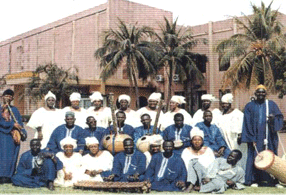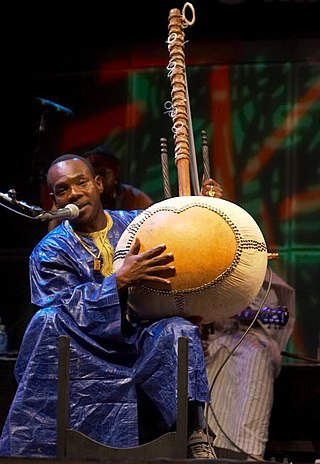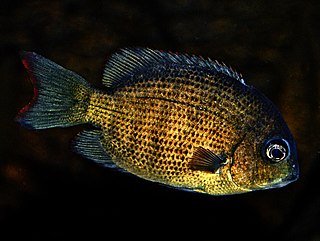Damba (Paretroplus damii) is a species of cichlid.
Contents
Damba may also refer to:
Damba (Paretroplus damii) is a species of cichlid.
Damba may also refer to:

The music of Mali is, like that of most West African nations, ethnically diverse, but one influence predominates: that of the ancient Mali Empire of the Mandinka. Mande people make up around 50% of Mali's population; other ethnic groups include the Fula (17%), Gur-speakers 12%, Songhai people (6%), Tuareg and Moors (10%).

A griot is a West African historian, storyteller, praise singer, poet, and/or musician.

Fanta Damba is a Malian djelimuso known to her fans as La Grande Vedette Malienne. Damba was a successful Mali musician born into the Jeli family, who are often called Griots. She began singing as a child while being surrounded by a family full of musicians. Damba began recording in her early twenties with Radio Mali. Fanta was one of Mali's most famous women from 1960 to 1970. In 1975, she became the first djelimuso to tour Europe solo and was also known for performing at the Mali national ensemble performance of the African Festival of Arts and Culture held in Lagos in 1977. She was rewarded for her talent by being named as a Ngara, which usually recognizes one as being a master musician. Many musicians aspire to be a Ngara, but very few held the title. In order for a Griot to be recognized as a Ngara, one must be considered to possess great courage, are skilled, experienced, disciplined and are a successful musician usually over the age of forty. It is considered a gift that most musicians are recognized as having at an early age. A Ngara also usually has a strong middle tone voice that can control the crowd with emotions. Mali women such as Fanta were known for their praise singing and did not play a variety of instruments unlike the men. She inspired other famous Mali musicians such as Yousou NDour, who went to visit Fanta and was so taken away by her music that he was inspired to write the song Wareff in relevance to Fanta's song Djadjiri. Female Mali musicians typically received more attention and gifts such as cars, houses, jewelry, and gold than male Mali musicians. They were represented through the media, concerts, markets, and were perceived as the stars. Fanta retired as a performer in 1985.

Toumani Diabaté was a Malian kora player. In addition to performing the traditional music of Mali, he was involved in cross-cultural collaborations with flamenco, blues, jazz, and other international styles of music. In 2006, the London-based newspaper The Independent named him one of the fifty best African artists. In its obituary, The Times described him as "a bold and innovative musical visionary".

Rokia Traoré is a Malian-born singer, songwriter and guitarist.
Sissoko is a surname, and may refer to:

Baba Sissoko is a Malian percussionist.

Guimba the Tyrant is a 1995 Malian comedy drama film in the Bambara language, directed by noted Malian director Cheick Oumar Sissoko. The movie shows the rise and fall of a cruel and despotic village chief Guimba, and his son Jangine in a fictional village in the Sahel of Mali. Some of the storytelling is done through the village griot, and with the film being placed in an old setting, this lends an epic touch to the movie. The exact chronological setting of the movie is difficult to ascertain, since it is set in an isolated village, but the commonly used weaponry shown is the blunderbuss. However, one scene outside the village features a neem tree, a species introduced to Africa in the colonial period. The film has some magical components, including a solar eclipse brought on by magic. Casting was only partially done from among professional actors.
Mah Damba is a traditional griot singer. She comes from a family of griots: her father, Djeli Baba Sissoko, was a griot and her aunt, Fanta Damba, is also considered a top vocalist.
Keita or Keïta may refer to:

The damba is a species of cichlid.

Paretroplus menarambo is a species of cichlid fish.
1992 presidential election may refer to:
Sotigui Kouyaté was one of the first Malian Burkinabé actors. He was the father of film director Dani Kouyaté, of the storyteller Hassane Kassi Kouyaté and of the actor Mabô Kouyaté and was a member of the Mandinka ethnic group.

Olivier Zuchuat is a Swiss film director. Born in 1969 in Geneva. After studying theoretical physics at EPFL and Trinity College and literature he became a teaching assistant at the University of Lausanne (Switzerland). He directed several theatrical productions of works by Bertolt Brecht and Heiner Müller and also worked as assistant with the German theater director Matthias Langhoff . Since 2001, he dedicates himself mainly with cinema. Since 2006, he has been teaching film studies at the Université de Paris-Est Marne la Vallée and at LA FEMIS Cinema School (Paris).
Fanta is a brand of fruit-flavored carbonated soft drinks
Ami Koita, nicknamed "the diva of Mandinga music", is a Malian singer.
Fatoumata Koné, is a Malian composer and singer. She sings in the Bamana language.
Issa is a given name that means Jesus in Arabic. It may refer to:
Kassé Mady Diabaté was a Malian singer, musician and griot. His soft and particular voice with deep undertones – an atypical characteristic for a griot – earned him the nickname "The golden voice of Mali". He is considered, together with Salif Keita, as one of the greatest Mandinka artists of his generation.